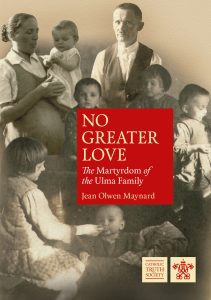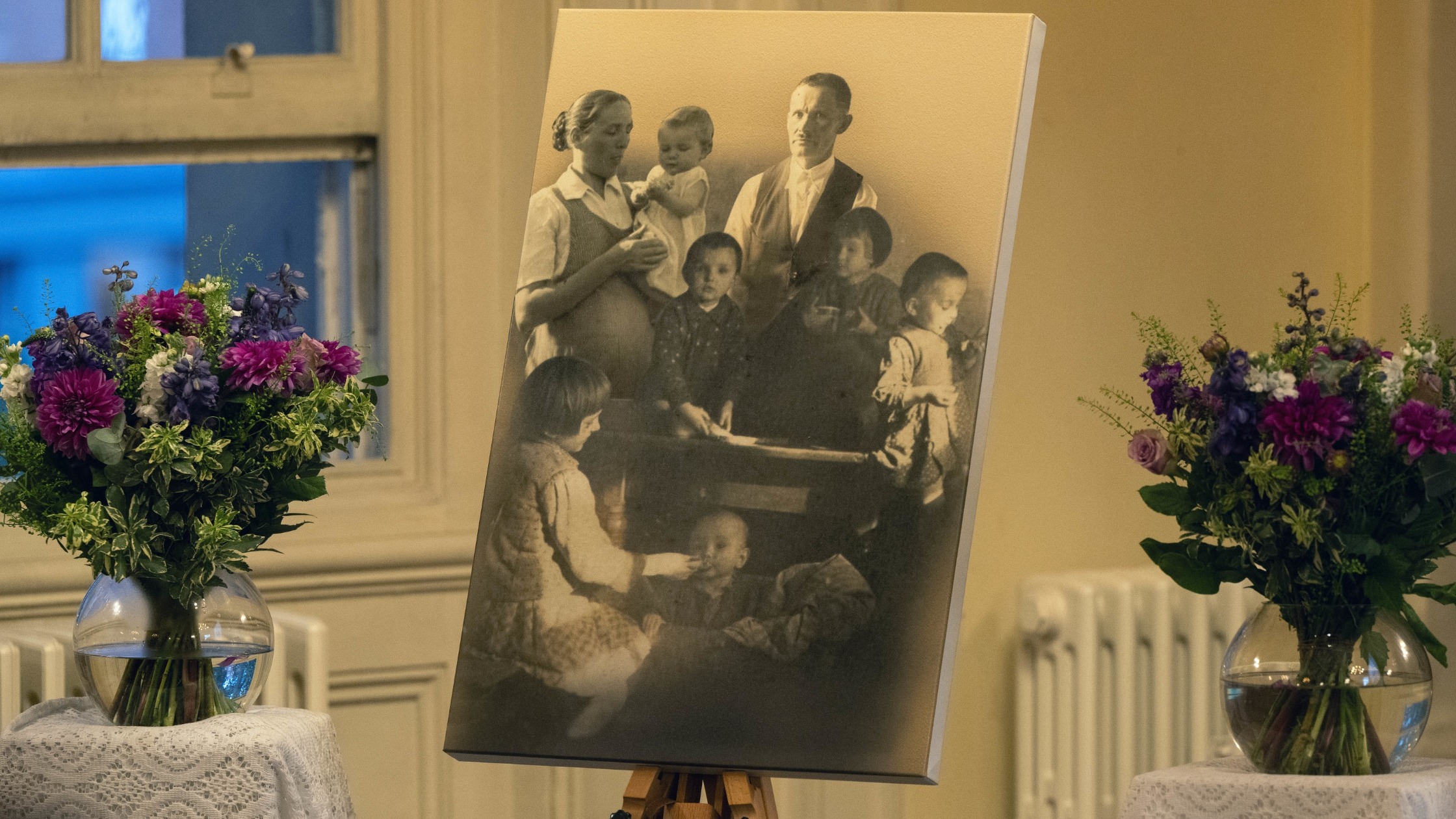This blog was originally given as a speech at a CTS event celebrating the beatification of the Blessed Ulma family.
The story of the Ulma family is so striking that it has been circulating not only amongst ‘clued up’ Catholics, but even in the secular press and mainstream social media. Perhaps some of you have had the experience I have had in the past few days: being sent a link or tagged in a post by non-Catholic, even non-Christian, friends wanting to know if I have heard about the Ulmas or if I can tell them more than the bare-bones, but harrowing, story of their deaths: parents and their seven children murdered by Nazis for concealing their Jewish neighbours.
For the fact that I have had more to say about this blessed family, I am greatly indebted to veteran CTS author, Jean Olwen Maynard, who did such a splendid job writing the new CTS biography No Greater Love: The Martyrdom of the Ulma Family. It’s not difficult to write a good book about an exciting or tragic event – all the work is done for you really — but Jean has a rare talent for writing just as well about the quieter, ordinary, everyday portions of holy lives, a gift clearly on display in her latest work. The thing about the Ulmas is that the event through which they lost their lives on earth and were ushered into Glory was just a flash, even of the youngest Ulma child’s life. It took only moments, and those short moments just aren’t enough to fill a book. But the biography that Jean has produced is much more than that: not just a meditation on a heroic death, but an account of what we might consider the unremarkable life that this family lived in a quiet village in Poland.
By “unremarkable,” I do not mean dull or unimportant. In fact, it is precisely unremarkable stories of family life that are so needed today. What captures our attention so easily in Jean’s biography is how like us this family was in many ways: Jozef and Wiktoria met through a bit of community theatre – a nativity play. After they married they worked hard to support themselves – Jozef seems to have been able to turn his hand to many things, including photography. Through his lens, we see an ordinary, busy family life. By modern standards at least, the Ulma’s were poor, but Jean writes of how they were saving up to buy a larger piece of land to better provide for their growing family: how many of us can relate to that? When you read the story of this family you will see that nothing in it suggests they set out be martyrs. From what Jean was able to learn, Jozef was nervous about taking in the Szalls and the Goldmans, and nothing could be more natural for a father of a young family. But everything about their life shows simple fidelity to their faith, to each other, and to their neighbours. So, despite danger and poverty, and even the practical difficulties of fitting eight more people into a modest house, they acted as they knew Christ would have.
The eye-catching headline about the Ulmas is that they gave their lives to protect their persecuted Jewish neighbours, and I don’t wish to downplay or dismiss the heroic sacrifice, but their ability to live their faith in such a complete and unselfish way did not come out of nowhere: it grew from the quiet love and faith of the Ulma home. It grew out of ordinary Christian virtues cultivated over time. I was struck, when the beatification was announced, that the Ulmas’ feast day was not to be the 24th March, the date of their deaths, but 7th July: Jozef and Wiktoria’s wedding anniversary. It is a beautiful and fitting day to honour a family of saints. That is the day when the ‘Ulma family’, in the sense that we talk about them, was born, for on 7th July in 1935 Jozef Ulma and Wiktoria Niemczak exchanged solemn vows before God, and the priest and congregation of St Dorota’s church in Markowa. And although two persons walked into the church that day, the Ulma family, the same family we now give thanks for, walked out. They could not have known in that moment what their faith and love would lead them to less than nine years later.
These are stories that are important to tell: the tales of ordinary holiness that come before heroic deeds. So, please share the story of the Ulma’s with the “ordinary” Christian families of today, for, while very few of us will win the crown martyrdom as did the Ulmas, all of us are called to follow them in Christian life.
It seems appropriate now to end my remarks as the book ends: with the prayer for the intercession of the Ulma family, one I know I shall pray very often to my new exemplar of Christian motherhood and my namesake, Wiktoria Ulma (with her spouse and children):
Almighty God, we thank You for the testimony of the heroic love of the spouses, Jozef and Wiktoria with their children, who gave their lives to save persecuted Jews. May their prayers and example support families in Christian life and help everyone to follow the true path of holiness. Amen
Continue Reading About the Ulmas in No Greater Love
 Under the Nazi occupation of Poland during World War II, Jews were indiscriminately arrested, imprisoned, and killed. Christians who helped them hide or escape placed themselves in the same peril. Józef and Wiktoria Ulma, who, guided by the parable of the Good Samaritan, which was underlined in red ink in the family Bible, sheltered a Jewish family in their village of Markowa. As a result, in 1944, Józef, Wiktoria, and their seven small children – one not yet born – were murdered by the Nazis. This biography tells the story of the heroic virtue and sacrifice that led to their beatification.
Under the Nazi occupation of Poland during World War II, Jews were indiscriminately arrested, imprisoned, and killed. Christians who helped them hide or escape placed themselves in the same peril. Józef and Wiktoria Ulma, who, guided by the parable of the Good Samaritan, which was underlined in red ink in the family Bible, sheltered a Jewish family in their village of Markowa. As a result, in 1944, Józef, Wiktoria, and their seven small children – one not yet born – were murdered by the Nazis. This biography tells the story of the heroic virtue and sacrifice that led to their beatification.
Order No Greater Love: The Martyrdom of the Ulma Family Today
